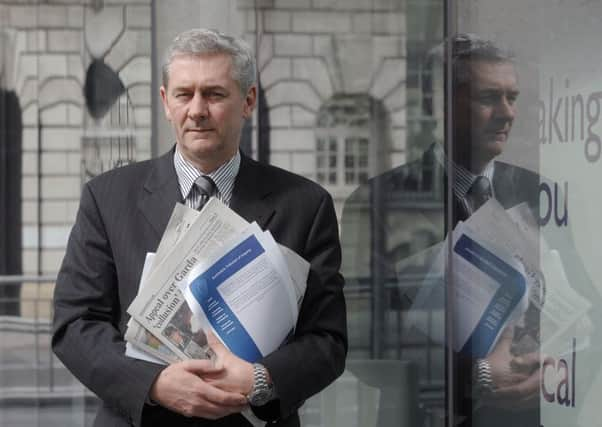'˜End of the line for paramilitary godfathers' report's author claims


Solicitor John McBurney – who along with Lord Alderdice and Monica McWilliams compiled the NI Executive’s plan for tackling paramilitary activity, criminality and organised crime – said its recommendations will result in severe sentences for those who continue to act as paramilitary godfathers.
Mr McBurney said the days of using the ‘Troubles legacy’ as an excuse for illegal activity should soon be over.
Advertisement
Hide AdAdvertisement
Hide AdThe panel charged with compiling the report, which was initiated as part of the Fresh Start agreement of November 2015, was announced in December.
At the time, the then First Minister Peter Robinson said the panel would “point the way in which we as a society can remove their [paramilitaries’] scourge”.
A total of £50 million will fund the five-year initiative, with £25m provided by the UK Government with the rest coming from Stormont.
The new report was published on Tuesday with the endorsement of Arlene Foster, Martin McGuinness and Justice Minister Clare Sugden.
Advertisement
Hide AdAdvertisement
Hide AdIn a joint statement they said: “This will be a challenging and ambitious programme of work but we are determined to provide the leadership necessary to address this challenge and bring about a peaceful and prosperous future for our community.”
The ministers added: “We believe the Fresh Start agreement and the panel report, along with the outcomes-based approach to cross-Executive working as represented in the draft Programme for Government, provide a unique opportunity to tackle paramilitary activity collectively...in an ambitious and collaborative manner.”
Mr McBurney said the process of implementing the report’s recommendations “has now begun in earnest”.
Mr McBurney said the work will be “intense and challenging,” and added: “It would be naive to think that disbandment of paramilitary groups can be achieved by some ‘quick fix arrangement’. It is a process, but one which needs urgent momentum towards a long-awaited goal.
Advertisement
Hide AdAdvertisement
Hide Ad“Those who are not prepared to make the journey, and to complete the transition from paramilitarism, will come within the scope of the new organised crime group legislation, which will probably take perhaps a couple of years to pass into law and to become fully operational.”
Mr McBurney added: “In the interim period, the wide range of actions set out in the executive plan, need to move forward at pace, with progress measured and reported. There can be no fudging of issues, or dithering in approach. As actions roll out, it will become clear which elements of each organisation are progressive and transitional, and which are not willing to budge.
“Those wedded to paramilitarism and associated organised crime activity, will face the new organised crime group legislation, and the major investigative endeavours of the various bodies engaged with the serious task of jointly tackling the abiding problem of paramilitarism and the associated organised crime activity.”
• Some opposition parties at Stormont have dismissed the Executive’s action plan to tackle paramilitary activity as “utterly weak” and “little more than a wish list”.
Advertisement
Hide AdAdvertisement
Hide AdUlster Unionist leader Mike Nesbitt said the panel’s report has “no real detail as to how to achieve its goals”.
He said: “We are deeply disappointed with the contents of the action plan, which has arrived three weeks late and utterly bereft of concrete actions. It isn’t an action plan. It’s a promissory note.”
Mr Nesbitt said the language used “suggests these people will be around in a structured paramilitary manner for years to come,” and added: “It is time, high time, they disbanded and ceased their destructive activities now.
“They terrorise their own communities, they put legitimate traders out of business and they stain our international reputation on the world stage. Enough is enough.”
Advertisement
Hide AdAdvertisement
Hide AdDavid Ford said it was disappointing that report failed to state a number of expected timescales and objectives.
The Alliance leader said it was “not what was needed to combat paramilitarism”.
He added: “Throughout the Executive response, there appears to be a lot of non-specific language, with no timescales, and little indication of funding to be provided. Without any measurable objectives, it would be simple for the Executive to fudge its actions over this matter.
“The response also commits many of the recommendations to existing reviews and processes, rather than demonstrating innovative thinking”.
The TUV’s Andrew Girvin described the report as “farcical”.
Advertisement
Hide AdAdvertisement
Hide Ad“Remember that the Executive only pretended to be exercised about the issue after Her Majesty’s Government produced a report which told us that the IRA not only existed but it had an Army Council, access to weapons and had been involved in murder,” he said.
“It is clear that the Executive not only doesn’t have any notion about how to deal with paramilitaries but has a vested interest in the public forgetting about the key role which one paramilitary group plays in the government of our Province”.